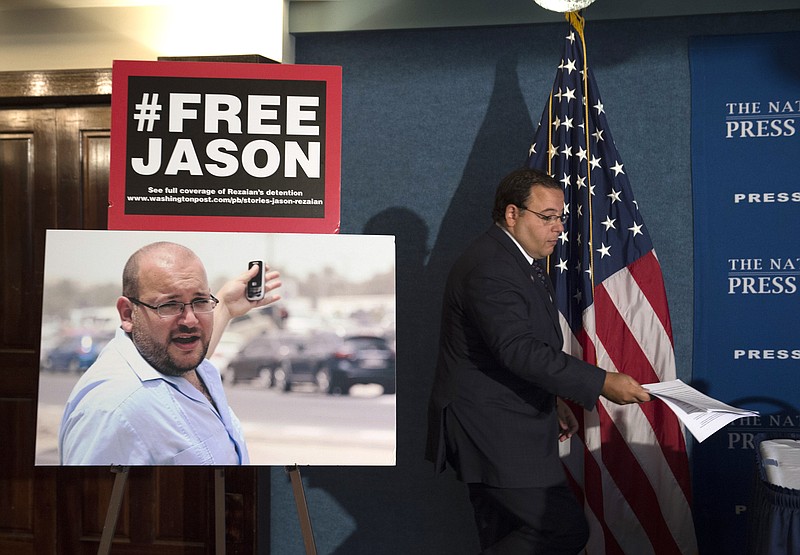WASHINGTON (AP) - The Washington Post has filed an urgent petition with the United Nations in the hopes that the institution will pressure Iran to release journalist Jason Rezaian, the newspaper's top editor and lawyers told U.S. reporters on Wednesday.
The announcement came on the one-year anniversary of the arrest of Rezaian and his Iranian wife, who was later released. Rezaian, the Post's bureau chief, remains in prison under charges of espionage and distributing propaganda against the Islamic Republic. He has faced three closed-door hearings, and it's unclear when a fourth - and likely final - hearing will be held or when a verdict will be reached.
The Post's lawyers and his family have denied the allegations and say Iran has no credible evidence to keep holding him. They also have criticized his conditions, saying Rezaian has lost 50 pounds since his arrest and remains under severe psychological strain.
"Every aspect of this case - his incarceration, his trial, the conditions of his imprisonment - has been a disgraceful violation of human rights. And it violates common decency," Post Executive Editor Martin Baron said at a news conference at the National Press Club.
Rezaian's supporters had hoped that the conclusion of U.S.-led talks on Iran's nuclear program last week would pave the way for his release, speculating that he might have been detained by Iran as leverage in the negotiations.
U.S. officials said they insisted upon keeping the nuclear talks separate from discussions about Rezaian and other U.S. prisoners held in Iran in case the negotiations faltered - a tactic Rezaian's brother, Ali, said he supported. Still, Secretary of State John Kerry has said U.S. officials raised the issue of captive Americans with Iran persistently during the nuclear deliberations.
The appeal was filed with the Geneva-based U.N. Human Rights Council's Working Group on Arbitrary Detentions. Its investigations usually give the country involved 60 days to respond, although the group also has an "urgent action" procedure intended to speed up the process. It was not known if that would be applied in this case.
The Post's lawyers said Iran has been responsive to about a third of the cases filed with the working group in the past decade. Jay Kennedy, the newspaper's general counsel, said the tactic hadn't been tried sooner because "we never expected his detention to last this long."
In the Iranian capital, Tehran, Deputy Foreign Minister Abbas Araghchi told reporters on Wednesday that cases of "imprisoned citizens" were discussed with their American counterparts during the nuclear talks. He said "humanitarian" reasons had motivated the discussion but did not elaborate.
It was the first confirmation by the Iranians of any talks that may have involved the fate of Rezaian and other U.S. prisoners in Iran: former U.S. Marine Amir Hekmati, Christian pastor Saeed Abedini, and retired FBI agent Robert Levinson.
Rezaian's defense lawyer, Leila Ahsan, told The Associated Press by telephone recently that the court has informed her the next session "almost certainly" will be the last one before a verdict is reached.
"Still, it's not clear how long it will take for the court to issue a verdict on the case after the last session," Ahsan said. She declined to comment further.
Rezaian is a dual U.S.-Iranian citizen who was born and spent most of his life in the United States. Iran does not recognize other nationalities as citizens. The Post has said Rezaian faces 10 to 20 years in prison if convicted.
His wife, Yeganeh Salehi, a journalist for The National newspaper in the United Arab Emirates capital of Abu Dhabi, and two photographers were detained along with Rezaian on July 22, 2014, in Tehran. All except Rezaian were later released.
___
Associated Press Writer Edith M. Lederer contributed to this report from the United Nations.
